In Bahir Dar anzukommen, oder viel mehr vom Rad zu steigen, hat sofort wieder alles geändert. Davor hatten wir gelitten, wir würden leiden wenn wir Bahir Dar wieder verlassen, aber für den Moment waren wir sicher. Untergetaucht in den Reihen der Touristen, die Bahir Dars Bürgersteige auf und ab gehen. Wir haben noch einmal die Gelegenheit genutzt um Fruchtsäfte zu trinken und mehr gutes Essen zu essen, Fabian ist am „freien Tag“ zu den Nilfällen gefahren. Allerdings wird der Nil da scheinbar fast komplett durch ein Wasserwerk umgeleitet und bei den Fällen fällt nichts.
Außerdem hat er mal wieder eine interessante Geschichte vom Typ Entwicklungshilfe Live erzählt: Der Nil fließt dort durch so enge Schluchten, dass es gerade über Sprungweite ist. Die lokale Bevölkerung baut sich ihre Brücken dann aus vier oder fünf Holzstämmen einfach über so eine schmale Stelle.
Das GIZ hat auch eine Brücke über den Nil gebaut. Ein paar hundert Meter Strom aufwärts von so einer Holzbrücke hat der Nil wieder eine beeindruckendere Breite und da steht jetzt auch eine neue, todschicke Hängebrücke, bezahlt von der deutschen Entwicklungshilfe.
Jetzt hab ich wenigstens eine gute Antwort auf die Frage, wo eigentlich mal die Deutschen helfen. Bisher musste ich mich immer damit rausreden, dass wir viele Projekte überall auf der Welt haben und man deswegen vor Ort nur, wenn überhaupt, einzelne hat. Jetzt kann ich sagen: „Kennt ihr die fancy überflüssige Brücke über den Nil…?“.
Ich hab sie nicht gesehen – das ist Fabians Geschichte. Aber ich finde sie super …
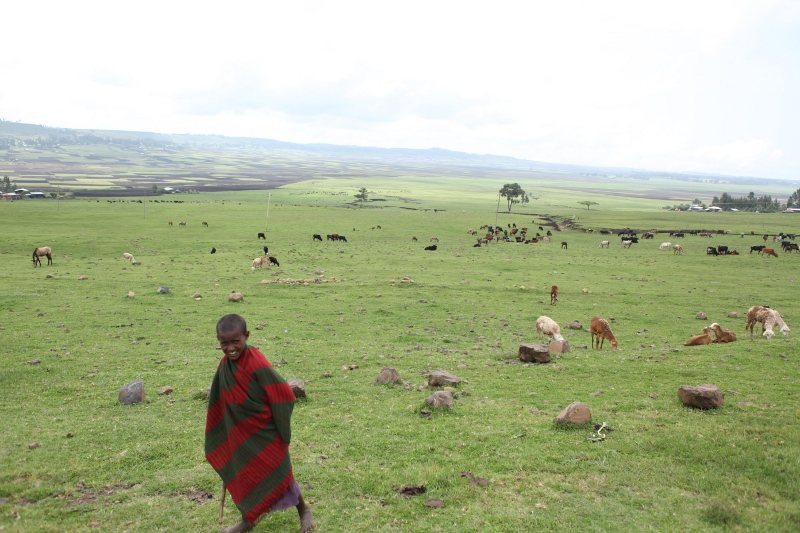
Also zurück nach Bahir Dar. Wir wollten am nächsten Morgen mal ausnahmsweise nicht explizit früh los und wir sind auch alles andere als früh losgekommen. Es hat nämlich in Strömen geregnet und Gonder, unser nächstes Ziel, war 180km, also anderthalb Tage, entfernt. Irgendwann hat der Regen aufgehört, wir sind losgefahren und natürlich hat es, wie schon in Fiche, wenige Kilometer später wieder angefangen. Diesmal war der Unterschied aber, dass es nicht am Nachmittag noch schön und sonnig geworden ist, sondern dass es einfach den ganzen Tag durchgeregnet hat.
Die ersten fünfzig Kilometer aus Bahir Dar raus waren auch die schlimmsten in ganz Äthiopien. Also eigentlich wären sie angenehm gewesen, die Temperaturen waren dank Regen in Ordnung, kein Wind und flach. Aber das Land war überflutet und der Großteil der Bevölkerung stand auf dem Damm, auf dem auch wir gefahren sind.
Und das war ein Problem. Wir haben diesmal ganze Steinsalven hinterhergeworfen bekommen, zwei Mal wurden wir getroffen, zwei mal hat uns jemand Stöcke in die Speichen geworfen. Und man sitzt auf dem Rad und sprintet die Straße entlang als sei es ein endloser Spießrutenlauf.
Ich habe mich bei dem Weg aus Bahir Dar raus gefragt, ob es eine gute Idee war zu schreiben, dass ich dem Kind vor die Füße gespuckt habe. Ich habe das getan um auszudrücken, wie absolut hilflos man ist. Das war eine Verzweiflungstat und ich habe sie nicht wiederholt.
Auch hier nicht, wo alles nochmal schlimmer wurde als in den Tagen davor. Aber wenn man losfährt und damit rechnet ist alles ein bisschen besser. Man kann auf dem Rad schreien und toben, die Kinder böse anstarren und verfluchen und beschimpfen, aber helfen tut nur die Flucht nach vorn.
Auf einmal erschien uns der Sudan als goldenes Ziel, das Licht am Ende des Tunnels. Nur noch raus aus Äthiopien, weg von diesen Kindern. Ich v.a. habe durch diesen Fluchtgedanken einen gigantischen Energieschub bekommen und wir sind den ganzen Tag durchgefahren, knapp 140km über zwei hohe Pässe, nur um dann in einem Ort anzukommen, wo wir schon beim einrollen rechts und links angebettelt wurden.
Wir haben auch versucht an dem Tag mit Locals zu reden um rauszufinden, was man dagegen machen soll. Die meiste Zeit waren wir zwar frustriert und haben einfach die ganze Welt um uns rum gehasst, aber es gibt eben doch immer wieder diese freundlichen Menschen, die einem eine Ecke hinter einer Steinigung „How is your travel?“ entgegenrufen. Die sind völlig entsetzt, wenn man sich über die Probleme beschwert. Ihre Lösung: Steine werfen. …
An anderer Stelle habe ich versucht die Eltern oder Erwachsenem von einem Kind zu konfrontieren, die daneben standen. Der wütende, schreiende Faranji hat aber nur für allgemeine Erheiterung gesorgt und so bin ich dann unter schallendem Gelächter und zwei weiteren Steinen weg gefahren.
Ich frage mich immer noch, was schlimmer ist. Die Kinder, die die Steine werfen oder die Eltern, die ihre Kinder für jeden Scheiß mit dem Stock eins auf die Löffel geben, aber für das Steinewerfen auf Faranjis mit Gelächter belohnen.
Irgendwann haben wir dann unsere gesamte Umgebung ignoriert und ausnahmslos jeden der sich aus welchem Grund auch immer genähert hat davon gejagt. Wir sind außerdem ausgesprochen kreativ im Vorstellen von mörderischen Lösungen für das Problem gewesen. Keine hat uns allerdings wirklich zufrieden gestellt…
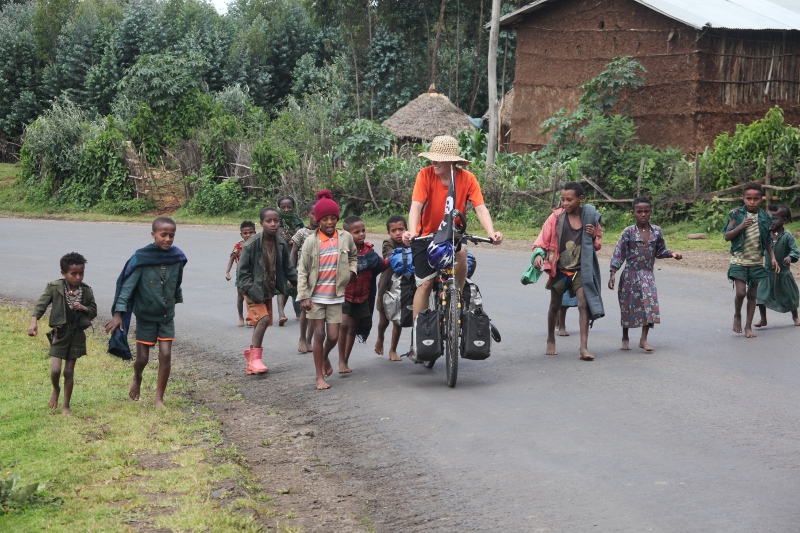
Das war der schlimmste Tag der Reise und es war gut, dass er vorbei war, als er es dann war. Wir waren klitschnass, durchgefroren, frustriert und sauer. Ende.
In der Nacht hatte ich übrigens drei Erfolge im Kampf gegen die Flöhe zu verbuchen, die sich in irgendeiner Absteige mal in meinem (warum nicht in Fabians ist mir immer noch ein Mysterium) Schlafsack eingenistet haben. Drei von ihnen zieren jetzt als Flecken die Seiten meines Notizbuchs, wo sie ein grausames Ende durch Verstümmelung erfahren haben. Ärgerlicher Weise hat mindestens einer überlebt und lässt mich immer noch jeden morgen komplett juckend aufwachen. Muss bei Gelegenheit mal Irgendwas „effektives“ dagegen unternehmen. Versuchen Flöhe zu fangen wenn sie gerade beißen ist nur sehr sehr begren zt effektiv.
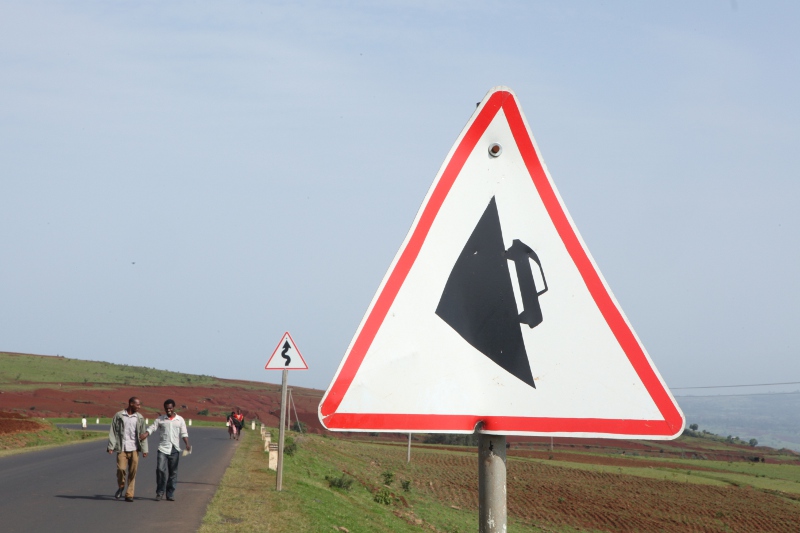
Und dann nach Gonder. Waren nur noch 45 Kilometer und weder von Zeit noch von Kraft ein Problem. Der Weg ging tendenziell berg auf und es hatte die ganze Nacht nicht aufgehört zu regnen, es war nur ein Stück kälter geworden.
In Azezo haben wir noch zwei andere Radler (cycle 2 kenya) aus England getroffen. Die hatten das vordere Zahnrad ihres Tandems beim Kette nachspannen aus irgendeinem Grund so sehr überlastet, dass das arme Zahnrad komplett verbogen war. Bei der gleichen Aktion haben sie scheinbar ihren Alugepäckträger so zerstört, dass sie ihn als irreperabel deklariert und zurückgelassen haben. Ihnen war nicht mal der Gedanke kommen den „irgendwie“ wieder zusammenzusetzen. Welcome to Africa, Jungs. Jetzt wollen sie die Hälfte ihres Gepäcks aussortieren um dann nur noch mit zwei Taschen (die fahren eh schon absolut Leichtgewicht) weiterzufahren. Jedem das Seine…
In Gonder haben wir dann wieder mal den Unterschied zwischen Rad und Nichtrad bemerkt. Kaum steigt man vom Fahrrad wird die Welt um einen rum freundlicher. Das hat zwei Gründe: Zum einen sind die Menschen tatsächlich freundlicher, man fällt nicht so auf, wird nicht so viel belästigt und bedrängt. Das andere ist, dass man auch selbst entspannter ist und sich auf mehr einlässt. Wir haben dann z.B. mit ein paar Kindern so eine Art Curlingabwandlung mit Steinen gespielt. Auf den Rädern hätten wir nur panisch versucht so schnell wie möglich von den Kindern mit den Steinen weg zu kommen. Aber dann kriegt man zu Fuß auch nichts hinterher geworfen, wird nicht so viel angebettelt, naja.. s.o.
Äthiopien ist und bleibt ein Backpackerparadies. Zum Fahrrad fahren ist es die Hölle.
Kurz: Wir freuen uns in drei Tag im Sudan zu stehen, oder viel mehr zu fahren.
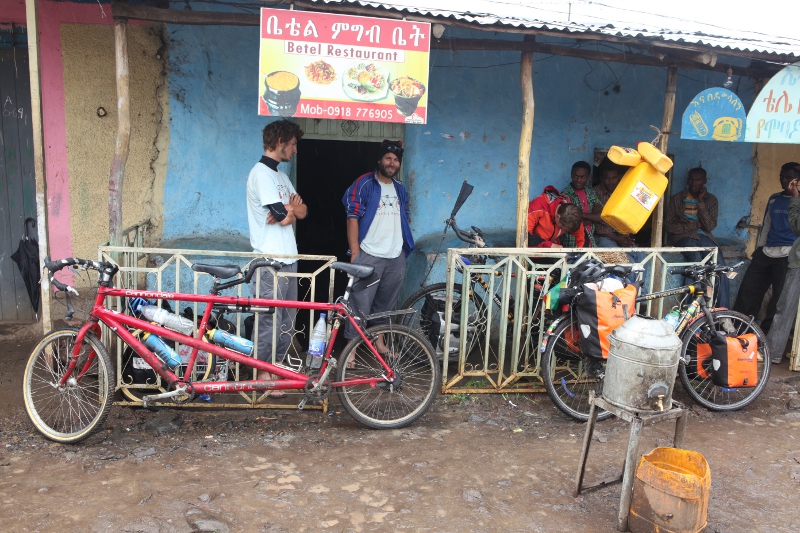
Bahir Dar and rather „not cycling in Ethiopia“ again proved to be heaven. Just as cycling is hell. And then after a day of fruit juice, pastries and gorgeous food we had to get back on the road again, to Gonder this time.
I took the day to relax but Fabian cycled some forty kms to the Nile Falls. He later told me there wasn’t actually much falling at the falls. The Ethiopian government had built an hydroelectric powerplant and redirected the Nile through that one, thus cutting most of the water from the falls. In one week though they would stop the power plant for some time to host a kayak world championship.
What really struck me was his stories about a German development project. Apparently our GIZ had decided to build a bridge over the Nile for the benefit of the local people and infrastructure. The old bridge was a few hundred meters downstream, four logs next to each other on a very narrow part of the stream. There seem to be several such narrow places which I would assume are predestined for building bridges. BUT: The GIZ had decided that building a bridge over a few meter wide section of the Nile was below their dignity and instead they built a brand new high tech, Golden Gate style bridge over a wider section. Oh well… At least I can now answer if somebody asks me again why he doesn’t see any German development projects in his area. We usually tried to explain that development work is spread all over the world and not in every single village in Ethiopia. But now I can just say: “Do you know that new fancy Nile-Bridge? That’s us…”
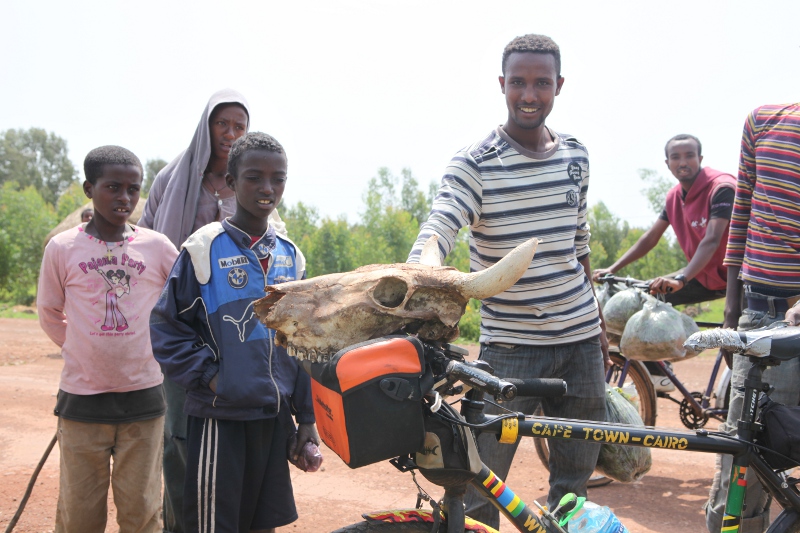
Okay. Enough of that. They’ll know what they’re doing with our tax money (I pay Mehrwertsteuer!). So the next day we left Bahir Dar again. We never wanted to leave early and we did not leave early. We actually left quite late because when we finally wanted to leave it was “raining cats and dogs” – that phrase remains me of certain English lessons at school…It stopped eventually, we got going and a few Kilometers after Bahir Dar it started again, just as in Fiche with the only difference that it did not stop raining this day. It just kept on pouring and pouring and again it was cold and miserable. We’re really not picky about weather conditions or mountains and everything would have been just fine if it hadn’t been for the people.Right after Bahir Dar you would climb up to a plateau which was flooded, some of the houses were ankle deep in the water and everybody was crowding on the dam on which the road ran. And everybody was pissed – or nobody liked us. Choose one.It never was that bad and it would never again be that bad. We were cycling there, again absolutely helpless and this time it wasn’t single stones thrown at us but whole rock volleys which the children hurled. They were waiting at the side of the road, stones ready in one hand, waving with the other and as soon as you passed them they would fire.This time we were hit but more than it hurt the legs or bikes it hurt the soul. What a sentence… but it’s true. They were also quite creative, not limited to stones. We had sticks flung at us, in our way and in Fabians case at his spokes. People were kicking at us, trying to hit us or just stuck to insulting or yelling insanely. Nobody got hurt, the bikes are in good shape.But it sucked. We were lucky that the stretch was quite flat so we could cycle at fast speed and give fleeing a try. It worked to a certain extent and it is absolutely the only thing you can do. You can’t get off the bike and start a fight or confront somebody (which was probably the only reason I did not get in a fight that day) because people would dash away as soon as you stop.There is no point in yelling and screaming and being furious because that will only earn you laughter from the people around you. There is no point in being violent against yourself or your bicycle because… well there is simply no point in it.There is also no point in trying to confront adults for their children’s behavior because they will only shrug if you’re lucky.When you ask the rare friendly locals they will readily provide you with the appropriate solution: Just pick up a stone and start stoning the children. If you refuse to do so they will also readily come to your defense and throw stones at the children themselves. Nobody understands why you don’t like throwing stones (or being thrown at).Perhaps people in Ethiopia should read a little Kant… But then I can’t blame them for not doing it. Literature is simply not available in Africa. The only thing you will find is religious, sometimes political, propaganda and textbooks.Back to topic. The kids were awful that day and what made it even worse is that either reaction always hits the wrong person. You will snarl at everybody along the road who even looks at you in an attempt to distress them from acting and you will always growl at the people who only want to wish you a pleasant stay in Ethiopia. And then when you’ve passed a few friendly people and start getting a bad conscience, start waving at people again the first one you smile at will stretch out his hand in reply.I didn’t do anything stupid that day. I only wrote about me spitting at the feet of that child last article to express my helplessness in that situation and I didn’t find a proper way to deal with it up to today. What we did is start the “Flucht nach vorn” … advancing retreat? We just kept going straight in the direction of Sudan. The light at the end of the tunnel, the savior from the awful cycling nation Ethiopia.Still, please keep in mind that Ethiopia is lovely if you backpack here. It is still one of my favorite places in the world for independent travel, people are great as soon as you get off the bike. I’ll just never ever attempt to climb on a bicycle here again. That’s a bad idea.The difference between the ways you experience a country while cycling or backpacking lies in two major factors. For one it’s of course yourself who is more exhausted, more annoyed and short tempered while cycling. You feel bothered quicker and you are more exposed (which up till now I had usually accepted as an advantage) to everything. You do get more attention from both friendly and awful people. When we got off the bikes in Gondar things changed immediately. Most people ignored us and we played a sort of rock-curling with a few kids on the street. If we were on the bicycles we would probably have tried to get as far away from those kids as possible.The other thing is the attitude of the people towards cyclists. It IS very different. We never get stones thrown at us while walking down a street and we don’t get harassed as much. Everything is just much more calm and pleasant while backpacking or “not-cycling”. – In Ethiopia. Rest of Africa is just fine.
We ended that day in a town with people yelling either Faranji or Money (both seem to be valid words for the same thing: (white) stranger) and hid in a small hotel.
At some point during the last week I must have slept in a bed filled with fleas, at least my sleeping bag had been infested with them for several days. I don’t know why I got them and Fabian not. I think that’s rather unfair and pretty lucky. They stink. Anyway I started a major flea hunt that night and managed to catch, main and kill three of them but one escaped and has been taking bitter revenge for his fellows ever since. I keep seeing him but I don’t seem capable of catching and killing him. If I do ever get him he shall suffer a thousand deaths before he dies.
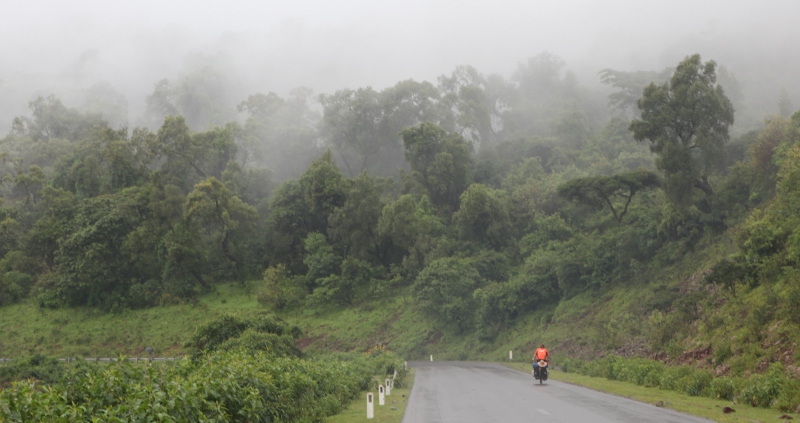
The next morning after my almost successful flea hunt the sun was shining, birds flying in the sky and everybody was smiling at us. Not. It rained, it had just continued all night long and it was even colder than the day before.
The good thing was that nobody smiled at us but that was mainly because there was nobody around anyway. Everybody seemed to be hiding from the awful weather which I would expect in November in Germany but not in August in Ethiopia. Still it was just good for us. Cycling is awesome in cool temperatures, the shoes were still soaking wet from the previous day so it didn’t make a difference anyway and we weren’t molested all day long. Couldn’t be better.
In Azezo, 35kms from where we started and 12 kms from our destination, we met two other cyclists (see blogroll at the very bottom of the main page, cycle2kenya) who cycled from somewhere in England to Kenya. While trying to shorten their chain and replace it they somehow destroyed their entire front gears and rack. We’ve got no clue how but it looked awful. We had
Sorry for interrupting here but this is LIVE NEWS: I just saw that goddamnsgfuhapew9ub of a flea and I gave him the antagonist name of Diego. Whenever I write about Diego I mean him and when I finally get my hands on him and tear his little legs out of his bean shaped body I will gladly inform you. And now back to topic.
We had breakfast with them, exchanged news about the further route and then we left to Gondar and they tried to get their tandem fixed. Also in Azezo my wallet was stolen and this time it was not returned to me. Credit card, 200 Birr (8 Euros) and ID gone but not a great loss. Credit Cards don’t work in Sudan, Egypt should accept Maestro again and well annoying but not devastating.Some time later we reached Gondar and once again did not choose a guide book hotel. It took us three tries to find something of similar quality for a third of the price. That book is after two years (Nov 2009) totally outdated and except for the general information absolutely useless. At least if you’re worried about “real” budget. I still don’t forgive LP listing the Sheraton Hotel in Addis…Gonder features some nice old stones which we visited today. Namely the royal enclosure, a group of palaces and castles and world heritage site in the centre of the city in which the monarchs dwelled in
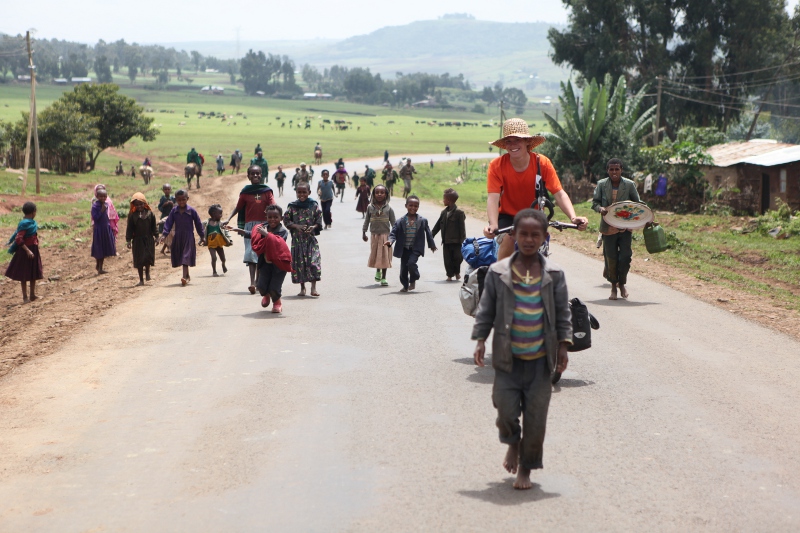
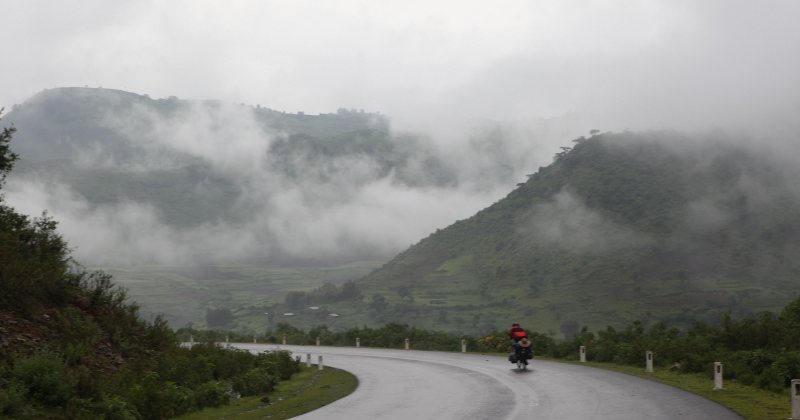
Hallo Tim jetzt habe ich euer Reise und Spenden Proekt beim Munchner Merkur gemeldet da jetzt der richtige zeitpunkt wäre wegen der Hungersnot ,war aber noch nichts drinngestanden.Das mit den Kindern muß schon sehr lästig sein.
Weiterhin gute Reise wünscht Euch Rudi Bichler Andechs
Ich war auch in Bahir Dar 2008. nach 22 Jahren habe ich meine mutter wieder gesehen in Bahir Dar.